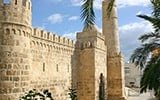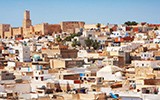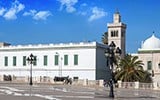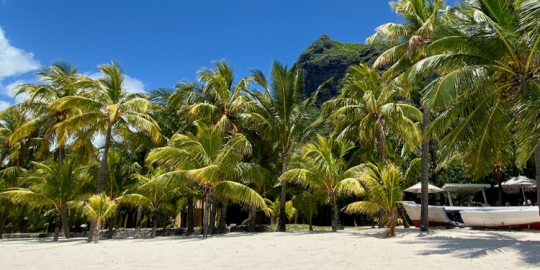Tunisia has one of the most developed healthcare systems in Africa. In big cities, the level of healthcare is often very close to ...
Living in Tunisia guide for expats
All the information you need to relocate and live in Tunisia.
Our selection of articles for expatriation in Tunisia
Whether you are about to work or set up a business in Tunisia, the first thing you should do is inquire about the county's labor ...
Before moving to Tunisia, whether you intend to work, settle or set up a business there, it is best to be aware of its economic ...
Compared to a lot of African countries, Tunisia is rather open towards young foreign graduates looking for internship ...
Located in North Africa, close to Europe and the Middle East, Tunisia attracts many foreign investors. Thanks to the ...
Tunis is the capital city of Tunisia. As the national economic and commercial capital city, it has been attracting many ...
Sousse is the third largest city in Tunisia and a popular expat destination in the country. Known as the “Pearl of the ...
Located between the Sahel and Southern Tunisia, Sfax is, above all, a business, tourist, port and industrial city. It is thus ...
The entry of foreign nationals into Tunisia is controlled by law No. 1968-198 of 22nd June 1968, amended in 1992. In short ...
If you are moving to Tunisia, you are probably wondering what you can do during your free time. The country provides a range of ...
Whether you are planning to move to Tunis or you have already settled there, you are probably wondering what you can do during ...
If you have decided to relocate to Tunisia, take enough time to choose your removal company. This is an important step not to be ...
When planning your move to Tunisia, you will probably be wondering whether your pet can accompany you. The country is rather open ...
Nowadays, phone and the Internet are almost an essential part of everyday life. So if you are moving to Tunisia, you will ...
Traveling around will definitely be part of your everyday life when moving to a foreign country. So when relocating in Tunisia ...
About Tunisia
Located in North Africa and at some 140 km from Europe, it enjoys its strategic position in attracting foreigners, including workers and investors. In fact, Tunisia is deemed to be an economic reference for Africa. Hence, moving there shall have several advantages, regardless of your situation.
Tunisia is a unicameral parliamentary republic. Tunis is its capital city.
Geography of Tunisia
Stretching over 164 155 km², Tunisia is found at the North African border, at 220.5 km South of Sicily, which is a two hours flight from Paris, one and a half hours flight from Geneva and a 50 minutes flight from Rome. Tunisia has not less than 1,300 km of coastlines, excluding its islands. The highest point of Tunisia is the Châambi at 1,544 m.
Sfax, Sousse, Nabeul, Bizerte, Kairouan, Monastir, Mahdia, Gabes, Tozeur, El Kef, Gafsa, Beja, Jendouba, Kasserine, Siliana, Medenine, Tataouine, Kebili, Sidi Bouzid, Zaghouan, Tabarka, Hammamet, Djerba and Zarzis are the major Tunisian cities.
Climate in Tunisia
Tunisia enjoys a Mediterranean climate in the North and along its coastlines. In the center and in the South, the climate is semi-arid.
The average sunshine in the country is several hours a day almost all year round. Temperatures generally vary between 12°C in December and 30.6 °C in July. Hence, in winter, temperatures never go below 10°C.
Rainfall is quite scarce in the country and rather occurs during winter, accounting for 75% of the total yearly record.
Regions in Tunisia
In Northern Tunisia, you will find the Medjerda plains on one side between the Kroumirie mountains and Mogods hills and the "Tunisian dorsal" on the other. The East is bordered by the Tunis Gulf and the Cap Bon Peninsula, specializing in market gardening.
In the Center, mountain ranges are separated by basins and fertile valleys. Further east, near the Sahel and Sfax regions, vast plains are covered with olive trees. Finally, in the South, you will find the great Chott Djerid depression and its riparian groves (Tozeur, Kebili and Douz), bordering the Sahara Desert. Djerba, which is a tourist island, is found near the coast, while Matmata Mounts are further to the East.
Demography in Tunisia
According to official statistics, as of July 2022, the population of Tunisia is around 12 million people. The national demographic growth rate accounts for 0.98%.
Most of the local population lives in the major agglomerations such as Greater Tunis, including cities like Tunis, Ariana, Ben Arous and Manoub.
Languages in Tunisia
Tunisia's official language is Arabic which, however, has a local variant known as Tunisian. In the South, you are likely to hear the Tunisian Chelha, which is a Berber dialect.
Most Tunisians start learning French at the primary school level, that is, from the third year. In fact, Tunisia is a mainly French-speaking country. French is compulsory at the baccalaureate level. Official texts, for their part, are written in Arabic and translated into French when it excludes internal and administrative communications, except in the case of those issued by the Ministry of Internal Affairs and Justice.
As regards road traffic signs, these are displayed in both French and Arabic. So you better have a good knowledge of either of these two languages when moving there.
Religions in Tunisia
The Tunisian population is known for being open-minded, friendly, tolerant and hospitable. Its openness to the rest of the world might be part of its rich legacy, inherited from great civilizations, as well as African, European and Mediterranean populations.
Most Tunisians are of the Muslim faith. In fact, Islam is the official religion. Still, the country is also home to Jew and Christian communities who practice their faith and belief in complete freedom, thus contributing to Tunisia's cultural diversity and making it a tolerant nation.
Other information about Tunisia
The national motto of Tunisia is 'Horiya, Karama 'Adala, Nizam' (phonetic Arabic), meaning Freedom, Dignity, Justice and Order.
Discover Humat Al-Hima, the national anthem, here.
The national currency is the Tunisian Dinar.
Tunisia is a member of the United Nations Organization, the International Criminal Court, the African Union, the Arab Maghreb Union (UMA), the Arab League, the Islamic Cooperation Organisation, the Organisation Internationale de la Francophonie, the Community of Sahel-Saharan States, the Non-Aligned Movement, the G77 and the Union for the Mediterranean.
Cost of living in Tunisia
The cost of living in Tunisia is quite affordable. For instance, you will be making considerable savings on buying fresh local products. However, imported products are naturally more expensive.
Note that 1 Euro amounts to some 3.22 Tunisian Dinars as of 2022. However, unless you are earning Euros while living in Tunisia, the local cost of living in the country is one of the highest in Africa, especially for those living in the North and in coastal regions. If you are earning in local currency, you should know that the cost of labor is lower. You should thus expect around 180 to 210 Tunisian Dinars per week.
Here is an example of an average budget estimate:
- 1,000 to 1,500 Euros per month, including rent, for a single person spending rationally
- 1,500 to 2,500 Euros per month, including rent, for a couple
- 2,500 to 3,500 Euros per month, including rent, for a couple with two children (taking into account that International schools are paid).
Good to know:
The Tunisian real estate market is quite favorable for expatriates. So if you wish to buy property, you should fairly manage to find a new and comfortable house at an attractive price.
Useful links:
Latest housing offers in Tunisia
Latest job offers in Tunisia












